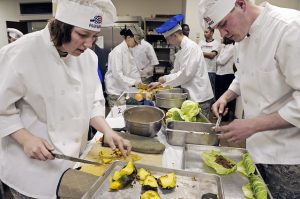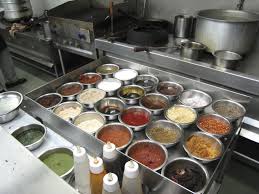Now that I don’t cook in professional kitchens, I can sit back and take an objective view of my chosen career. It’s a brutal job. We ran morning to night. Food is all I thought about. Personalities were a focus. Who I was working with that day affected my mood.
 It may seem like cooking is a solo act. Something that you do in your own home, alone, or one lone wolf competing against other renegades to win some title or money, but that really isn’t the case. In the professional culinary world it takes a team of people – sometimes dozens or even hundreds – to create an enjoyable dining experience, one plate at a time.
It may seem like cooking is a solo act. Something that you do in your own home, alone, or one lone wolf competing against other renegades to win some title or money, but that really isn’t the case. In the professional culinary world it takes a team of people – sometimes dozens or even hundreds – to create an enjoyable dining experience, one plate at a time.
In a professional kitchen there is an obvious hierarchy. In each restaurant, there are stations on the line. These all have to work in harmony with each other in order to produce great food. A restaurant doesn’t get a Michelin star because it wants one. It gets a star because the Chef and the team work together to create harmony out of chaos.
Large kitchens, like those at major hotels, use the brigade system, modeled after the Royal Navy of England. This system was put into place in the late 19th century. As a cook in the brigade I had my part.
Working in the Culinary Army
 Most lines in a kitchen run with a minimum staff of three. At the top-ranked resort where I worked for six years, there were at least 80-90 cooks on staff at all times. During the summer, when it’s hot in Phoenix and no one wants to eat, the numbers dropped, but not by much. There were six departments that produced food: one full service restaurant (breakfast, lunch, dinner), the pool “Cabana” (almost every hotel calls it that) that cranks out nachos and burgers, the fine dining restaurant serving classic French cuisine, room service that runs 24/7, garde manger (keeper of the food – coldside), and the banquet kitchen (hotside).
Most lines in a kitchen run with a minimum staff of three. At the top-ranked resort where I worked for six years, there were at least 80-90 cooks on staff at all times. During the summer, when it’s hot in Phoenix and no one wants to eat, the numbers dropped, but not by much. There were six departments that produced food: one full service restaurant (breakfast, lunch, dinner), the pool “Cabana” (almost every hotel calls it that) that cranks out nachos and burgers, the fine dining restaurant serving classic French cuisine, room service that runs 24/7, garde manger (keeper of the food – coldside), and the banquet kitchen (hotside).
During season, which in Arizona is September through June, all of the kitchens run at full tilt. With the exception of room service, every single kitchen is staffed with no less than five cooks and usually more.
I worked tournade, which meant I could go into any one of these kitchens and produce food and then walk away. It was a great challenge to keep four restaurant menus and plating styles in my head, as well as banquet plating, but hotels, good hotels, need cooks who can rotate through each one of their kitchens. I worked all stations and in most of the departments. This included garde manger, saute, grill, and on occasion, I joined the pastry crew to plate up banquets. I worked poolside, slinging burgers and chicken fingers, and I cooked in the fine dining restaurant, where even the littlest mistake was noticed and corrected. With each experience I gained skills unique to the task at hand, and this experience has given me a unique perspective on the term Chef.
The Head of the Brigade
In these kitchens temperatures run high, both literally and figuratively, and there’s a fair amount of pressure to produce quality food at the speed of light. It is this stress that can produce anger in people. Cooks have access to quite a few weapons: sharp implements, hot oil, blunt instruments, and fire. Any combination of these tools that I use to make your food can also be used as a weapon to take out the guy standing next to me. That “hit ‘em in the head with a frying pan” didn’t really come from home kitchens, it came from cooks with rising tempers and access to heavy objects. I’ve been in situations where knives were grabbed, bodies shoved, fights and knock outs in the walk-in. I’ve been witness to, and part of, several violent exchanges.
It takes a cool-headed chef to keep these tempers from flaring and to keep cooks from harming each other. One look from a chef can calm the hottest cook in the kitchen, if they have respect. It’s like when your mom says your name in that “voice.” That’s the response a good chef can, and needs to, elicit.
A team of well-honed and expert cooks can help a chef put together a great plate of food. Grooming the crew to become this well-oiled machine where egos are removed and the only focus is cooking and presenting the best food possible is the chef’s job.
A kitchen crew is about people who know each other, maybe worked together in other restaurants. A chef knows that hiring his best cook’s buddy can make the crew, sometimes it can break it if the friendship sours.
Putting together a team like this is what can create that memorable meal of your dreams. These compadres, these line-mates that spend most of their waking hours together, will work five hours straight on a line without any kind of break, or 12 hour days in banquets, with an occasional smoke or quick meal standing up. They will strive to put together flavor combinations that make you tingle and hum. A crew that respects their chef will do almost anything for them, they will churn and burn for her, go to any length to protect that chef’s reputation. A successful kitchen is built on this tightly knit brigade of comrades.
Whether it’s a banquet for 1,000 or dinner service in a small, intimate restaurant, chances are if the food is good the cooks usually like each other. They understand what their purpose is. Love of food is the glue that sticks these unlikely comrades together — that and presenting you with a plate of food or a banquet that you won’t ever forget.
For more stories from professional kitchens: Skills of A Chef: Plate, Skills of a Chef: How I Learned to be a Control Freak, Skills of a chef, Palate.






